Mohammed VI of Morocco
| Mohammed VI محمد السادس ⵎⵓⵃⵎⵎⴷ ⵡⵉⵙ ⵚⴹⵉⵚ | |||||
|---|---|---|---|---|---|
 | |||||
| King of Morocco | |||||
| Reign | 23 July 1999 – present | ||||
| Predecessor | Hassan II | ||||
| Heir apparent | Moulay Hassan | ||||
| Prime Ministers | |||||
| Born |
21 August 1963 Rabat, Morocco | ||||
| Spouse | Salma Bennani (m. 2001) | ||||
| Issue Detail |
Crown Prince Moulay Hassan Princess Lalla Khadija | ||||
| |||||
| House | House of Alaouite | ||||
| Father | Hassan II | ||||
| Mother | Lalla Latifa Hammou | ||||
| Religion | Sunni Islam | ||||
Mohammed VI (Arabic: محمد السادس, Amazigh: ⵎⵓⵃⵎⵎⴷ ⵡⵉⵙ ⵚⴹⵉⵚ; born 21 August 1963)[1] is the current King of Morocco. He ascended to the throne on 23 July 1999 upon the death of his father, King Hassan II.[2]
Early life and education
Mohammed was the second child and oldest son of Hassan II and his second wife, Lalla Latifa Hammou.[3] On the day of his birth, Mohammed was appointed Heir Apparent and Crown Prince.[4] His father was keen on giving him a religious and political education from an early age— at the age of four, he started attending the Qur'anic school at the Royal Palace.[1]
Mohammed completed his primary and secondary studies at Royal College and attained his Baccalaureate in 1981, before gaining a bachelor's degree in law at the Mohammed V University at Agdal in 1985.[5] His research paper dealt with "the Arab-African Union and the Strategy of the Kingdom of Morocco in matters of International Relations".[1] He has also frequented the Imperial College and University of Rabat.[4] He was furthermore appointed President of the Pan Arab Games, and was commissioned a Colonel Major of the Royal Moroccan Army on 26 November 1985. He served as the Coordinator of the Offices and Services of the Royal Armed Forces until 1994.[4]
In 1987, Mohammed obtained his first Certificat d'Études Supérieures (CES) in political sciences, and in July 1988 he obtained a Diplôme d'Études Approfondies (DEA) in public law.[1] In November 1988, he trained in Brussels with Jacques Delors, then-President of the European Commission.[1]
Mohammed obtained his PhD in law with distinction on 29 October 1993 from the French University of Nice Sophia Antipolis for his thesis on "EEC-Maghreb Relations".[1] On 12 July 1994, he was promoted to the military rank of Major General, and that same year he became President of the High Council of Culture and Commander-in-Chief of the Royal Moroccan Army.
He speaks Arabic, English, Spanish and French.[6]
King of Morocco
| Moroccan Royal Family |
|---|
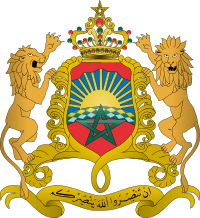 |
HRH Princess Lalla Lamia
|

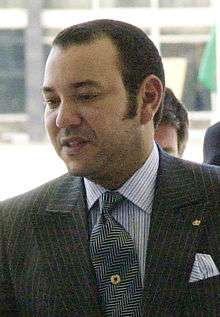
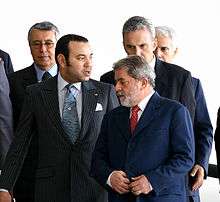
On 23 July 1999, Mohammed succeeded his father as king, being enthroned in Rabat on 30 July.[4]
Social reforms and liberalization
Shortly after he took the throne, Mohammed VI addressed his nation via television, promising to take on poverty and corruption, while creating jobs and improving Morocco's human rights record. Mohammed's reformist rhetoric was opposed by Islamist conservatives, and some of his reforms angered fundamentalists. In February 2004, he enacted a new family code, or Mudawana, which granted women more power.[7]
Mohammed also created the so-called Instance Equité et Réconciliation (IER), which was tasked with researching human rights violations under Hassan II. This move was welcomed by many as promoting democracy, but was also criticized because reports of human rights violations could not name the perpetrators. According to human rights organisations, widespread abuses still exist in Morocco.[8][9][10] The 2011 Moroccan protests were motivated by corruption and general political discontentment, as well as by the hardships of the global economic crisis.
In December 2010, the whistleblowing website WikiLeaks published diplomatic cables which alleged high-level corruption involving the King himself.[11]
In a speech delivered on 9 March 2011, the King said that parliament would receive "new powers that enable it to discharge its representative, legislative, and regulatory mission". In addition, the powers of the judiciary were granted greater independence from the King, who announced that he was impaneling a committee of legal scholars to produce a draft constitution by June 2011.[12] On 1 July, voters approved a set of political reforms proposed by Mohammed.
The reforms consisted of the following:[13]
- The Berber language[14] is an official state language along with Arabic.[15]
- The state preserves and protects the Hassānīya language and all the linguistic components of the Moroccan culture as a heritage of the nation[15]
- The King has now the obligation to appoint the prime minister from the party that wins the most seats in the parliamentary elections, but it could be any member of the winning party and not necessarily the party's leader. Previously, the king could nominate anybody he wanted for this position regardless of the election results. That was usually the case when no party had a big advantage over the other parties, in terms of the number of seats in the parliament.[13][16][17]
- The King is no longer "sacred or holy" but the "integrity of his person" is "inviolable"[18]
- High administrative and diplomatic posts (including ambassadors, CEOs of state-owned companies, provincial and regional governors), are now appointed by the prime minister and the ministerial council which is presided by the king; previously the latter exclusively held this power.[19][20]
- The prime minister is the head of government and president of the council of government, he has the power to dissolve the parliament.[21]
- The prime minister will preside over the Council of Government, which prepares the general policy of the state. Previously the king held this position.[21]
- The parliament has the power of granting amnesty. Previously this was exclusively held by the king[22]
- The judiciary system is independent from the legislative and executive branch, the king guarantees this independence[21][23]
- Women are guaranteed "civic and social" equality with men. Previously, only "political equality" was guaranteed, though the 1996 constitution grants all citizens equality in terms of rights before the law[17]
- The King retains complete control over the armed forces, foreign policy and the judiciary;[24] authority for choosing and dismissing prime ministers[25] and he retains control of matters pertaining to religion.
- All citizens have the freedom of thought, ideas, artistic expression and creation. Previously only free speech and the freedom of circulation and association were guaranteed.[17][26] However, criticizing or directly opposing the king is still punishable with prison.
Business and wealth

Mohammed VI is Morocco's leading businessman and banker.[27] In 2009, he was estimated by Forbes magazine to be worth US$2.5 billion,[28] and the Moroccan Royal Family has one of the largest fortunes in the world.[29] Along with his family, they hold the majority stakes in the Société Nationale d'Investissement (SNI), which was originally state-owned but was merged in 2013 with Omnium Nord Africain (ONA Group), to form a single holding company that was taken off the Casablanca Stock Exchange—resulting in the scrapping of an equivalent of 50 billion Dirhams Marketcap (~US$6 billion).[30] SNI has a diverse portfolio consisting of many important businesses in Morocco and operating in various sectors such as; Attijariwafa Bank (banking), Managem (mining), Onapar, SOMED (Tourism/real-estate and exclusive distributor of Maserati), Wafa Assurance (insurance), Marjane (hypermarket chain), Wana-Inwi (telecommunications), SONASID (Siderurgy), Lafarge Maroc (cement manufacturer), Sopriam (exclusive distributor of Peugeot-Citroën in Morocco), Renault Maroc (exclusive distributor of Renault in Morocco) and Nareva (energy).[30][31] SNI also owns many food-processing companies and is currently in the process of disengaging from this sector.[30] Between mid-2012 and 2013 SNI sold; Lessieur, Centrale Laitière, Bimo and Cosumar to foreign groups for a total amount of ~$1.37 billion (11.4 billion Dirhams including 9.7 billion in 2013 and 1.7 in 2012).[30]
SNI and ONA both owned stakes in Brasseries du Maroc, the largest alcohol beverages manufacturer and distributor of brands such as Heineken in the country.[32]
Mohammed VI is also a leading agricultural producer and land owner in Morocco, where agriculture is exempted from taxes.[30] His holding company "Siger" has shares in the large agricultural group "Les domaines agricoles" (originally called "Les domaines royaux", now commonly known as "Les domaines"), which was founded by Hassan II.[30] In 2008 Telquel estimated that "Les domaines" had a revenue of $157 million (1.5 billion Dirhams), with 170,000 tons of citrus exported in that year.[30] According to the same magazine, the company officially owns 12,000 hectares of agricultural lands.[30] "Chergui", a manufacturer of dairy products, is the most recognizable brand of the group.[30] Between 1994 and 2004, the group has been managed by Mohammed VI's brother-in-law Khalid Benharbit, the husband of Princess Lalla Hasna.[30] "Les domaines" also owns the "Royal Golf de Marrakech", which originally belonged to Thami El Glaoui.[30]
His palace's daily operating budget is reported by Forbes to be $960,000—which is paid by the Moroccan state as part of a 2.576 billion Dirhams/year budget as of 2014[33]—owing much of it to the expense of personnel, clothes, and car repairs.[29]
Allegations of corruption
Royal involvement in business is a major topic in Morocco but public discussion of it is sensitive. The US embassy in Rabat reported to Washington in a leaked cable that "corruption is prevalent at all levels of Moroccan society".[11] Corruption allegedly reaches the highest levels in Morocco, where the business interests of Mohammed VI and some of his advisors influence "every large housing project," according to WikiLeaks documents quoted by Britain's Guardian newspaper.[34] The documents released by the whistleblower website also quote the case of a businessman working for a US consortium, whose plans in Morocco were paralysed for months after he refused to join forces with a company linked with the royal palace. Decisions on big investments in the kingdom were taken by only three people, the documents quote a company executive linked to the royal family as saying. The three are the king, his secretary Mounir Majidi, and the monarch's close friend, adviser and former classmate Fouad Ali Himma, the executive said at a meeting with potential investors in a Gulf country. This corruption especially affects the housing sector, the WikiLeaks documents show.[35]
Controversy
20 February Movement
The legitimacy of the king Mohammed VI was contested in 2011 with the 20 February Movement that attempted to undermine the functioning of the monarchic system.
Royal pardon scandal
Protests broke out in Rabat, the capital of Morocco, on 2 August 2013, after Mohammed VI pardoned 48 jailed Spaniards, including a pedophile who had been serving a 30-year sentence for raping 11 children aged between 4 and 15. He has since revoked the pardon, after popular outrage.[36]
Family
Mohammed VI has one brother, Prince Moulay Rachid, and three sisters: Princess Lalla Meryem, Princess Lalla Asma, and Princess Lalla Hasna. On 21 March 2002,[4] Mohammed married Salma Bennani (now H.R.H. Princess Lalla Salma) in Rabat. Bennani was granted the personal title of Princess with the title of Her Royal Highness on her marriage. They have two children – Crown Prince Moulay Hassan, who was born on 8 May 2003, and Princess Lalla Khadija, who was born on 28 February 2007.[7]
Mohammed's birthday on 21 August is a public holiday,[37] although festivities were cancelled upon the death of his aunt in 2014.[38]
Titles, honours and styles
| Royal styles of King Mohammed VI of Morocco | |
|---|---|
 | |
| Reference style | His Majesty |
| Spoken style | Your Majesty |
The official style of the King is "His Majesty the King Mohammed the Sixth, Commander of the Faithful, may God grant him victory" (صاحب الجلالة الملك محمد السادس أمير المؤمنين نصره الله Ṣāḥib al-Jalālah al-Malik Muḥammad al-Sādis, 'Amīr al-Mu'minīn, Naṣṣarahu-Illāh). When he is executing his duty as head of the Royal Moroccan Armed Forces, he is generally referred to as the "Commander-in-Chief."
Honours and decorations
- National orders
-
 Grand Master of the Order of Muhammad of Morocco (23 July 1999)
Grand Master of the Order of Muhammad of Morocco (23 July 1999) -
 Grand Master of the Order of the Independence of Morocco (23 July 1999)
Grand Master of the Order of the Independence of Morocco (23 July 1999) -
 Grand Master of the Order of Fidelity of Morocco (23 July 1999)
Grand Master of the Order of Fidelity of Morocco (23 July 1999) -
 Grand Master of the Order of the Throne of Morocco (23 July 1999)
Grand Master of the Order of the Throne of Morocco (23 July 1999) -
 Grand Master of the Order of Military Merit of Morocco (23 July 1999)
Grand Master of the Order of Military Merit of Morocco (23 July 1999) -
 Grand Master of the Order of Ouissam Alaouite of Morocco (23 July 1999)
Grand Master of the Order of Ouissam Alaouite of Morocco (23 July 1999)
Mohammed VI has received numerous honours and decorations from various countries, some of which are listed below.
- Foreign orders
-
 Collar of the Order of Civil Merit of Spain (2 June 1979)[39]
Collar of the Order of Civil Merit of Spain (2 June 1979)[39] -
 Grand Cordon of the Order of the Republic of Tunisia (August 1987)[40]
Grand Cordon of the Order of the Republic of Tunisia (August 1987)[40] -
 Grand Cross of the Order of Merit of the Italian Republic of Italy (18 March 1997) with Collar (11 April 2000)[41]
Grand Cross of the Order of Merit of the Italian Republic of Italy (18 March 1997) with Collar (11 April 2000)[41] -
 Collar of the Order of al-Hussein bin Ali of Jordan (March 2000)[40]
Collar of the Order of al-Hussein bin Ali of Jordan (March 2000)[40] -
 Grand Cordon of the Order of National Merit of Mauritania (April 2000)[40]
Grand Cordon of the Order of National Merit of Mauritania (April 2000)[40] -
 Grand Cordon of the National Order of Mali of Mali with Collar (14 June 2000)[40]
Grand Cordon of the National Order of Mali of Mali with Collar (14 June 2000)[40] -
 Collar of the Order of Isabella the Catholic of Spain (16 September 2000)[42]
Collar of the Order of Isabella the Catholic of Spain (16 September 2000)[42] -
 Wissam of the Order of Oumayid of Syria (9 April 2001)[40]
Wissam of the Order of Oumayid of Syria (9 April 2001)[40] -
 Wissam of the Order of Merit of Lebanon Special Class (13 June 2001)[40]
Wissam of the Order of Merit of Lebanon Special Class (13 June 2001)[40] -
 Cordon of the Order of Abu Bakar Siddiq of the International Red Cross and Red Crescent Movement (29 June 2001)[40]
Cordon of the Order of Abu Bakar Siddiq of the International Red Cross and Red Crescent Movement (29 June 2001)[40] -
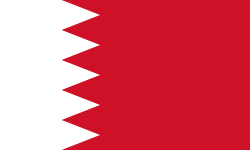 Grand Collar of the Order of al-Khalifa of Bahrain (28 July 2001)[40]
Grand Collar of the Order of al-Khalifa of Bahrain (28 July 2001)[40] -
 Collar of the Order of Mubarak the Great of Kuwait (22 October 2002)[40]
Collar of the Order of Mubarak the Great of Kuwait (22 October 2002)[40] -
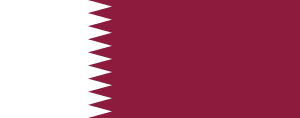 Cordon of the Order of the Independence of Qatar (25 October 2002)[40]
Cordon of the Order of the Independence of Qatar (25 October 2002)[40] -
 Grand Cordon of the Order of the Nile of Egypt (28 October 2002)[40]
Grand Cordon of the Order of the Nile of Egypt (28 October 2002)[40] -
 Grand Cross of the Order of Pakistan First Class (Nishan-e-Pakistan) of Pakistan (19 July 2003)-->
Grand Cross of the Order of Pakistan First Class (Nishan-e-Pakistan) of Pakistan (19 July 2003)--> -
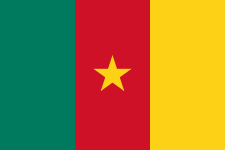 Grand Cross of the Order of Valour of Cameroon (17 June 2004)[40]
Grand Cross of the Order of Valour of Cameroon (17 June 2004)[40] -
 Grand Cross of the Order of the Equatorial Star of Gabon (21 June 2004)[40]
Grand Cross of the Order of the Equatorial Star of Gabon (21 June 2004)[40] -
 Grand Cross of the National Order of the Niger of the Niger (24 June 2004)[40]
Grand Cross of the National Order of the Niger of the Niger (24 June 2004)[40] -
.svg.png) Grand Cordon of the Order of Leopold I of Belgium (5 October 2004)-->
Grand Cordon of the Order of Leopold I of Belgium (5 October 2004)--> -
 Collar of the Order of the Southern Cross of Brazil (26 November 2004)[40]
Collar of the Order of the Southern Cross of Brazil (26 November 2004)[40] -
 Medal of Honour of the Congress of Peru (1 December 2004)[40]
Medal of Honour of the Congress of Peru (1 December 2004)[40] -
 Collar of the Order of Bernardo O'Higgins of Chile (3 December 2004)[40]
Collar of the Order of Bernardo O'Higgins of Chile (3 December 2004)[40] -
 Grand Collar of the Order of the Liberator General San Martin of Argentina (7 December 2004)-->
Grand Collar of the Order of the Liberator General San Martin of Argentina (7 December 2004)--> -
 Grand Cross of the Order of Charles III of Spain (23 June 1986)[43] with Collar (14 January 2005)[44]
Grand Cross of the Order of Charles III of Spain (23 June 1986)[43] with Collar (14 January 2005)[44] -
 Grand Collar of the Order of the Aztec Eagle of Mexico (11 February 2005)[40]
Grand Collar of the Order of the Aztec Eagle of Mexico (11 February 2005)[40] -
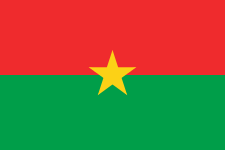 Grand Cross of the Order of Burkinabé of Burkina Faso (1 March 2005)[40]
Grand Cross of the Order of Burkinabé of Burkina Faso (1 March 2005)[40] -
 Supreme Collar of the Order of the Chrysanthemum of Japan (28 November 2005)[40]
Supreme Collar of the Order of the Chrysanthemum of Japan (28 November 2005)[40] -
 Grand Commander of the Order of the Republic of the Gambia (20 February 2006)[40]
Grand Commander of the Order of the Republic of the Gambia (20 February 2006)[40] -
 Grand Cross of the Order of Merit of the Congo of the Republic of Congo (22 February 2006)[40]
Grand Cross of the Order of Merit of the Congo of the Republic of Congo (22 February 2006)[40] -
 Grand Cross of the Order of the National Heroes of the Democratic Republic of the Congo of Congo-Kinshasa (28 February 2006)[40]
Grand Cross of the Order of the National Heroes of the Democratic Republic of the Congo of Congo-Kinshasa (28 February 2006)[40] -
 Commander Grand Cross with Chain of the Order of the Three Stars of Latvia (14 May 2007)[40]
Commander Grand Cross with Chain of the Order of the Three Stars of Latvia (14 May 2007)[40] -
 Collar of the Order of Abdulaziz Al Saud (18 May 2007)[40]
Collar of the Order of Abdulaziz Al Saud (18 May 2007)[40] -
 Grand Collar of the Order of Independence of Equatorial Guinea (17 April 2009)[40]
Grand Collar of the Order of Independence of Equatorial Guinea (17 April 2009)[40] -
 Grand Cross of the Royal Victorian Order (1980)
Grand Cross of the Royal Victorian Order (1980)
On 22 June 2000, Mohammed received the honorary doctorate from George Washington University.[45]
Ancestry
| Ancestors of Mohammed VI of Morocco | ||||||||||||||||||||||||||||||||||||||||||||||||||||||||||||||||||||||||||||||||||||||||||||||||||||||||||||||||||||||||||||||||||||||||||||||||||||||||||||||||||||||||||||||||||||||||||||||||||||||||||||||||||||||||||||||||||||||||||||||||
|---|---|---|---|---|---|---|---|---|---|---|---|---|---|---|---|---|---|---|---|---|---|---|---|---|---|---|---|---|---|---|---|---|---|---|---|---|---|---|---|---|---|---|---|---|---|---|---|---|---|---|---|---|---|---|---|---|---|---|---|---|---|---|---|---|---|---|---|---|---|---|---|---|---|---|---|---|---|---|---|---|---|---|---|---|---|---|---|---|---|---|---|---|---|---|---|---|---|---|---|---|---|---|---|---|---|---|---|---|---|---|---|---|---|---|---|---|---|---|---|---|---|---|---|---|---|---|---|---|---|---|---|---|---|---|---|---|---|---|---|---|---|---|---|---|---|---|---|---|---|---|---|---|---|---|---|---|---|---|---|---|---|---|---|---|---|---|---|---|---|---|---|---|---|---|---|---|---|---|---|---|---|---|---|---|---|---|---|---|---|---|---|---|---|---|---|---|---|---|---|---|---|---|---|---|---|---|---|---|---|---|---|---|---|---|---|---|---|---|---|---|---|---|---|---|---|---|---|---|---|---|---|---|---|---|---|---|---|---|---|---|
| ||||||||||||||||||||||||||||||||||||||||||||||||||||||||||||||||||||||||||||||||||||||||||||||||||||||||||||||||||||||||||||||||||||||||||||||||||||||||||||||||||||||||||||||||||||||||||||||||||||||||||||||||||||||||||||||||||||||||||||||||
See also
References
- 1 2 3 4 5 6 "King Mohammed Ben Al-Hassan". Embassy of the Kingdom of Morocco. Retrieved 18 February 2010.
- ↑ "World: Africa Mohammed VI takes Moroccan throne". BBC News. 24 July 1999. Retrieved 18 February 2010.
- 1 2 Royal Ark. Royal Ark. Retrieved on 22 July 2015.
- 1 2 3 4 5 MOROCCO14. Royalark.net. Retrieved on 4 March 2012.
- ↑ "Biography of HM. King MohammedVI", Maroc.ma.
- ↑ "Biography of HM. King Mohammed VI". Retrieved 1 December 2014.
- 1 2 "Morocco country profile". BBC News. 16 December 2009. Retrieved 18 February 2010.
- ↑ MacFarquhar, Neil (1 October 2005). "In Morocco, a Rights Movement, at the King's Pace". New York Times. Retrieved 18 February 2010.
- ↑ Harter, Pascale (19 April 2005). "Facing up to Morocco's hidden fear". BBC News. Retrieved 18 February 2010.
- ↑ "Morocco/Western Sahara: Amnesty International welcomes public hearings into past violations". Amnesty International. Retrieved 18 February 2010.
- 1 2 Black, Ian (6 December 2010). "WikiLeaks cables accuse Moroccan royals of corruption". The Guardian (London). Retrieved 16 June 2011.
- ↑ Mohammed VI speech. Moroccansforchange.com (9 March 2011). Retrieved 4 March 2012.
- 1 2 BBC News (29 June 2011). "Q&A: Morocco's referendum on reform". Retrieved 1 February 2013.
- ↑ A standardized version of the 3 native Berber dialects of Morocco: Tashelhit, Central Atlas Tamazight and Tarifit.
- 1 2 Article 5 of the 2011 Moroccan constitution
- ↑ Article 47 of the 2011 Moroccan constitution
- 1 2 3 1996 Moroccan constitution
- ↑ Article 46 of the 2011 Moroccan constitution
- ↑ Article 91 of the 2011 Moroccan constitution
- ↑ Article 49 of the 2011 Moroccan constitution
- 1 2 3 AFP. "Maroc: la réforme constitutionnelle préconise de limiter certains pouvoirs du roi". Parisien. Retrieved 24 August 2011.
- ↑ Article 71 of the 2011 Moroccan constitution
- ↑ Article 107 of the 2011 Moroccan constitution.
- ↑ Voice of America (30 July 2011). "Moroccan King Calls for Prompt Parliamentary Elections". Retrieved 8 December 2012.
- ↑ Canada Free Press (18 August 2011) "Arab Royal Houses Seek Affordable Medicines". Retrieved 27 January 2013.
- ↑ Driss Bennani, Mohammed Boudarham and Fahd Iraqi. "nouvelle constitution. plus roi que jamais". Telquel. Retrieved 24 August 2011.
- 1 2 GREENE (24 April 2008). "MOROCCAN ROYAL FAMILY HOLDING ONA FIRES CEO". Consulate Casablanca. Retrieved 15 November 2013.
- ↑ "In Pictures: World's Richest Royals". Forbes. 17 June 2009. Retrieved 18 November 2013.
- 1 2 Pendleton, Devon; Serafin, Tatiana (30 August 2007). "In Pictures: The World's Richest Royals". Forbes.
- 1 2 3 4 5 6 7 8 9 10 11 Fahd Iraqi; Mehdi Michbal (14 June 2013). "http://www.telquel-online.com/En-couverture/SNI-Le-nouveau-visage-du-business-royal/573". Telquel. External link in
|title=(help); - ↑ Ahmed Reda Benchemsi; Fahd Iraqi (18 July 2009). "Le Businessman" (PDF). TelQuel. Retrieved 18 November 2013.
- ↑ Nouaim SQALLI (3 January 2006). "Bourse: Les filiales de l'ONA boostent le marché de blocs". l'Economiste. Retrieved 18 November 2013.
- ↑ Ahmed Benseddik (12 November 2013). "Benkirane a bien augmenté le budget royal de " Sidna "". Demain Online. Retrieved 15 November 2013.
- ↑ "US embassy cables: Moroccan sacking exposes king's business role". The Guardian. 6 December 2010.
- ↑ "US embassy cables: Moroccan businessman reveals royal corruption, claims US cable". The Guardian. 6 December 2010.
- ↑ Yaakoubi, Aziz El. (3 August 2013) Moroccan police break up protest against royal pardon of Spanish pedophile. Reuters.com. Retrieved on 2015-07-22.
- ↑ "Morocco Official, Public and National Holidays". Morocco.com. Retrieved 21 August 2013.
- ↑ "title". Retrieved 18 August 2014.
- ↑ Boletín Oficial del Estado. (PDF) . Retrieved on 22 July 2015.
- 1 2 3 4 5 6 7 8 9 10 11 12 13 14 15 16 17 18 19 20 21 22 23 24 25 26 HM King Mohammed VI. map.ma
- ↑ Quirinale website. Quirinale.it. Retrieved on 22 July 2015.
- ↑ Boletín Oficial del Estado. (PDF) . Retrieved on 22 July 2015.
- ↑ Boletín Oficial del Estado. (PDF) . Retrieved on 22 July 2015.
- ↑ Boletín Oficial del Estado. (PDF) . Retrieved on 22 July 2015.
- ↑ "His Majesty The King Mohammed VI". Embassy of the kingdom of Morocco to United States of America. Retrieved 27 September 2013.
External links
| Wikimedia Commons has media related to Mohammed VI of Morocco. |
| Wikiquote has quotations related to: Mohammed VI of Morocco |
- Morocco Alaoui dynasty
- King Mohammed VI Grants Exclusive First-ever Interview to Time
- Laurenson, John. The most powerful man in Morocco. BBC News. 11 March 2006.
- Constitutional Reform in Morocco: I Am the Reform!
| Mohammed VI Born: 21 August 1963 | ||
| Regnal titles | ||
|---|---|---|
| Preceded by Hassan II |
King of Morocco 1999–present |
Incumbent Heir apparent: Moulay Hassan |
| ||||||||||||||||||||||
| ||||||||||||||||||||||||||||||||||||||||||
| ||||||||||||||||||||||||||||||||||||||
|